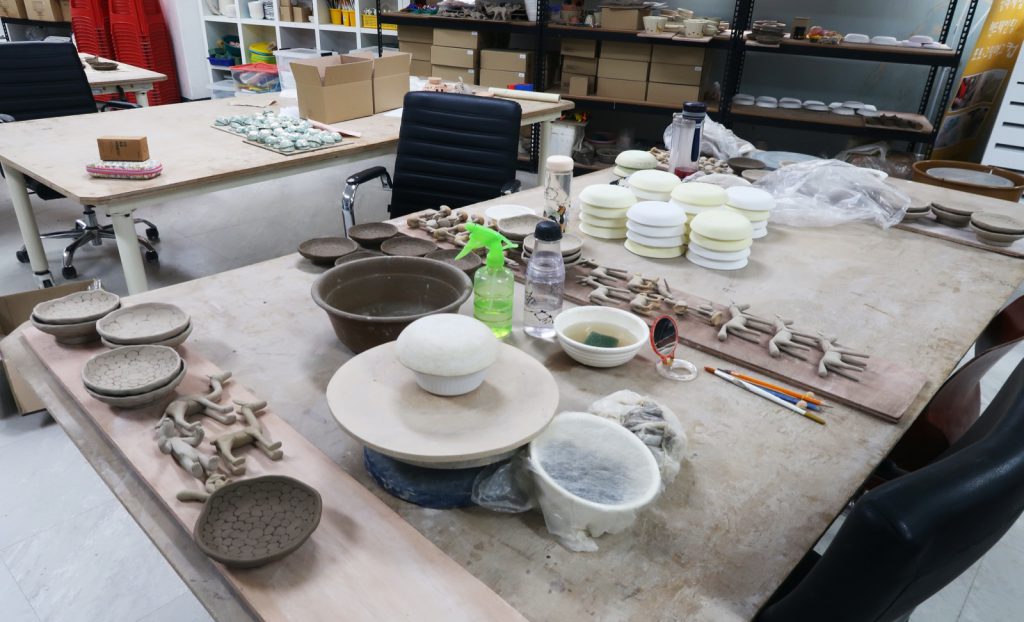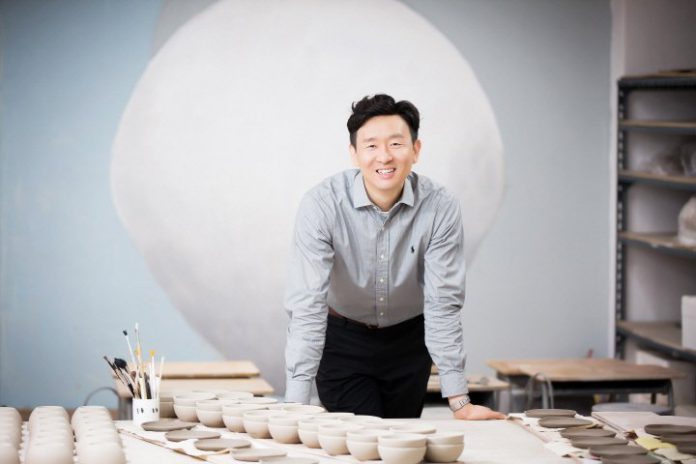Kim Jongsoo, CEO of Spring Shine, shares stories working with disabled artists in his social enterprise.
By Eve Lee in Seoul
Kim Jongsoo was offered a job by his friends in 2015. The new opportunity was to be the chief executive officer of a social enterprise, Spring Shine. But the company was confronting severe financial difficulties at that time. “I had a stable life. Though I studied social work at university and worked in a social enterprise to help refugees, still I hesitated to accept the offer. I had never been a CEO,” he says.
Reviving a Cash-trapped Company
Spring Shine is a company established in 2012 to provide employment opportunities to disabled artists.
“The first thing I did as a CEO was to reform the company. The company only had 600,000 won (USD$600) in its bank account when I took over,” Kim says. He decided to revive the company so that he could help disabled artists build their career and let them create artworks. Kim says the easiest way was to close the business and restart it again, but he did not want anyone to lose their jobs.
He bought paints to renovate the office with disabled artists and student volunteers. “The company’s core business was operating pottery classes. So, I renovated a dusty company and turned it into a proper crafting studio and office,” he says.

While renovating the company, Kim continued to apply for social enterprises’ certification by the Korea Social Enterprise Promotion Agency (KoSEA), a government-affiliated institute under the Ministry of Employment and Labour.
The semi-official agency defines social enterprise as a company or organisation which operates business with social missions. The government subsidises them and recognise them as certified social enterprises. Spring Shine was officially recognised as a social enterprise in 2016.
Art is for Everyone
With KoSEA’s subsidy, Kim and his team were able to run more pottery classes. More people joined the pottery classes after the renewal of the studio and the social enterprise’s financial difficulties were eventually resolved.
Kim launched a professional potter cultivation project for the disabled in 2017. It was a success and the project helped the social enterprise enjoy a stable income. The social enterprise also opened a design school in January 2020 to help talented disabled artists to cultivate their potential.
Kim says they welcome people with different levels of disabilities to participate in the potter cultivation project and join the design school. “Disabled artists can approach us in many ways. Some disabled people are recommended by partner institutions such as LG Social Campus and Seoul Rehabilitation Centre on Intellectual Developmental Disabilities, and some join us after buying our products such as clothes and cups,” Kim says.

Kim hopes to let more disabled artists shine with their talents. The social enterprise now provides jobs to seven non-disabled employees and five artists with developmental disabilities. Disabled employees are paid a minimum wage of 8,580 won ($7.51USD) per hour or according to their degree of disability and workload.
Disabled artists create their artworks in the crafting studio and the artworks are put on sale. “We sell artworks to increase our revenue and we have to be competitive in the market,” Kim says. Kim led his team to hold an artwork exhibition “Sogon Sogon” in December 2019, featuring artwork by disabled artists. “I aim to pursue both social value and feasibility of this social enterprise,” Kim says.
Kim says the company is having a difficult time this year because of the pandemic, and all physical classes are cancelled. “This can be an opportunity to strengthen our online connection with the public,” he adds. Under the COVID-19 new normal, Kim plans to host more online exhibitions.
Strivings for Stable Employment
In South Korea, private companies with over 50 workers are required to employ disabled people who should make up 3.1 per cent of a company’s workforce. But Kim believes the employment reality is still harsh for the disabled as there is barely any opportunity for them.
“If disabled children cannot find a job after graduation, their parents must stay at home to take care of them,” Kim says. “This causes many social problems, because family members of disabled children have to rely on a single income source,” Kim adds.
Spring shine to Hearten People
After working at the social enterprise for five year, Kim says, “My perception towards the disabled people has changed a lot.”
Kim says his understanding of disabled was limited before he became a CEO. He viewed disabled people as those who need help. But, now, he values each of them as a talented artist. Kim observes the uniqueness in disabled artists’ artwork.
“Emotion and love are expressed very honestly in disabled artists’ artwork, and this makes it unique and special,” Kim says. “We do not merely employ them because they are disabled. We employ them because they are talented,” Kim adds.
Kim hopes his company can let every disabled artist’s talents shine like the company’s name. “I believe their artwork will touch people’s hearts like a warm and dazzling spring shine,” Kim says.
“I believe their artwork will touch people’s hearts like a warm and dazzling spring shine.”
Edited by Regina Chen







































